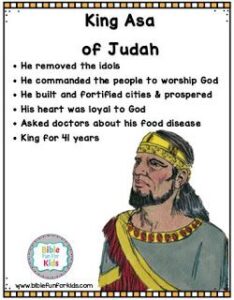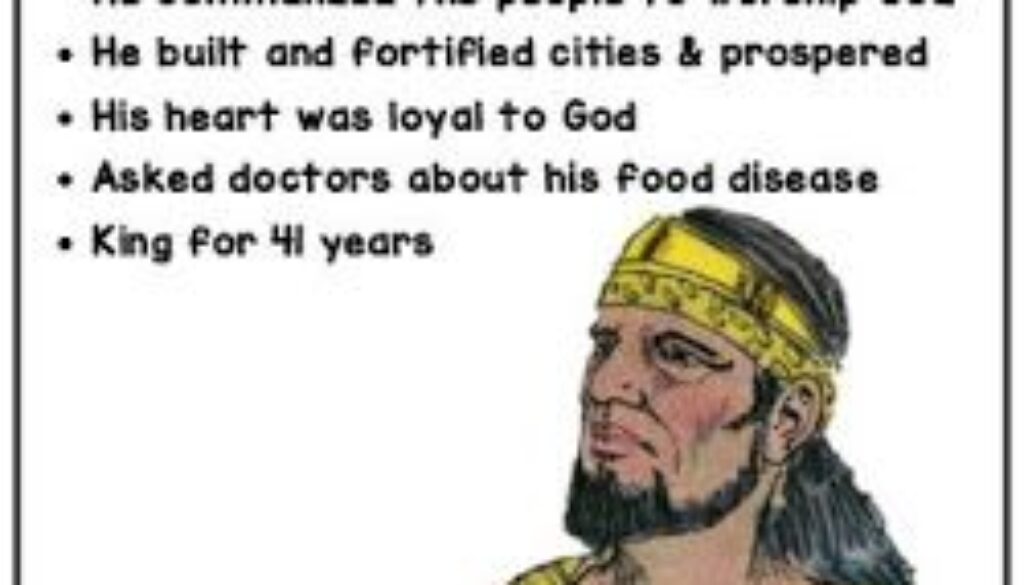1 Kings 15:9-24 Asa’s Reign

Judah has another king. This time they have a godly king. His name is Asa. He will bridge the end of Jeroboam’s reign and covers six kings of Israel.
Still ‘shuffling cards’ in our history of the two kingdoms. Judah is on its third king since Israel was broken in two. The two previous kings were NOT good kings. They let Judah fall into idol worship. Not as bad as Jeroboam had, for he led the people into such practices.
Asa turns the nation of Judah around. He calls them back to God and leads the way with his life and his policies. Hooray for Asa! We even get to find out a few of his acts. Double hooray!
One of the first things we learn about Asa is that his reign was long. It lasted 41 years. We don’t know how old he was when he took the throne but God must have blessed him with a long life, for that time in history, to reign for such a long time. This would also mean that any political enemies he had, God took care of.
Something amazing about Asa is that not even his own family was exempt from his rule. David had a hard time correcting his children when they weren’t following the Lord. Asa didn’t have this blind spot. He even made his mother give up her position after she made “an abominable image for Asherah” (verse 13b).
The place where Asa burned the idol his mother had made is a familiar place for me. I was wondering about its history so far. Was this the place where Jacob buried the idols that were carried with his group before setting off to the place God called him? No. That was Shechem. Did someone else use this place to destroy idols? Not before Asa did, but another king of Judah would follow suit and make it truly famous. Is it where Solomon was crowned king? No, that was Gihon. Then why was this place so familiar to me?
The Kidron brook or Kidron valley was mentioned in several stages of David’s retreat from Absalom. It is mentioned in both his going and coming and it stuck in my mind. But in today’s reading Asa is going to initiate it in a new tradition. It will go from a simple landmark into a place of special remembrance. The first of many idols meets an end in this valley at the hands of king Asa. And it is the idol his own mother made.
As she was married to Abijam, who allowed idol worship, her practices are not that shocking. The fact that her son turned his back on the practices of both his parents is. Somehow God reached down into this family and touched Asa. Abijam wasn’t totally without God’s influence in his life as he had a form of godliness in his reign by continuing the daily sacrifices and practices in the Temple. But his heart wasn’t in them. Asa’s heart was ‘sold out’ completely to God.
Asa didn’t clean up the whole land but he did “put away the male cult prostitutes out of the land and removed all the idols that his father had made” (verse 12) along with cutting down and burning the image his mother had made. It sounds like he cleaned up Jerusalem at least. “But the high places were not taken away” (verse 14a).
War continued between Israel and Judah. Abijam struck a crippling blow to Jeroboam and Asa didn’t need to worry about him. But two kings later (on Israel’s side) and war was once again an issue. Asa didn’t fight this battle the conventional way by sending soldiers. Instead, he undermined the alliance Israel had made with Syria.
“In the fifth year of king Rehoboam, Shishak king of Egypt had come up against Jerusalem. He took away all the treasures of the house of the Lord and the treasures of the king’s house. He took away everything” (1 Kings 14:25-26a). Apparently the treasuries began to be rebuilt. I say this because Asa used them as a bribe to turn his adversary into a friend. What probably tipped the scale in Asa’s favor, besides God, was the fact that there was a relationship between blood ancestors of both men. Their “fathers” had been in a “covenant” together. Covenants are the sincerest form of promises and have survived generations. And it didn’t hurt one bit to have such a relationship with God on Asa’s part. HE put His thumb on the scale and broke the “covenant” between Israel and Syria.
I’m curious what that “covenant” entailed. It was probably sworn to between false gods. Our Living God is the maker of TRUE covenants. Only His endure the test of time.
Back to our story. Ben-hadad not only switched sides but he turned the tide of the whole conflict. The blockade was abolished and the materials were ‘repurposed’ for Judah’s benefit. Israel also lost many key cities to Syria.
I’m curious about the comment about Asa’s feet. First this comment tells us that Asa lived to be an old man and continued on the throne. But what about his feet? Did the disease in them end his reign? Did it end his life? Maybe we will find out somewhere else in scripture.
One last thing that did strike me in our reading is the place where Baasha ruled from. He didn’t rule from Shechem like Jeroboam did. We aren’t told where Nadab ruled from. He only ruled for one year before being assassinated. But I’m wondering if this is going to be the norm, kings ruling from wherever they happen to be from. Judah’s rulers all came from the same family and ruled from the same place; Jerusalem. The fact that the northern kingdom, Israel, had walked away from God left them rudderless. The Temple, God’s house where He put His name, was missing from their lives. They would move about from ‘pillar to post’ with nothing to hold fast to; in their physical and spiritual lives. Judah at least had the place God called His own to cling to. They wandered spiritually but they never completely forgot who He was, is, and forever will be. Their ‘spiritual wandering’ would one day leave them physically rudderless too.
Father God, I’m SO glad there were at least a few godly kings during this time to bring the people back from destruction. There is much more to come on both sides of the divide, spiritually and physically, but You NEVER forgot Your people. They abandoned You but You didn’t abandon them. My life with You is proof of that. You built a foundation of relationship and covenant that still hold today. THANK YOU that my eternity isn’t dependent on my faithfulness. I would be doomed! But it is built on YOURS. Even in my darkest hours, You still reach out to me and reach down into my life to draw me back to You. Asa’s life was proof of this. With the parents he had, it could only be through YOUR hand that he turned to You. I wonder what his defining event was. What was it that opened his eyes to the truth of Your love? I wonder if it was a lot of little moments or one really big one. I guess I’ll have to ask him when I see him.



